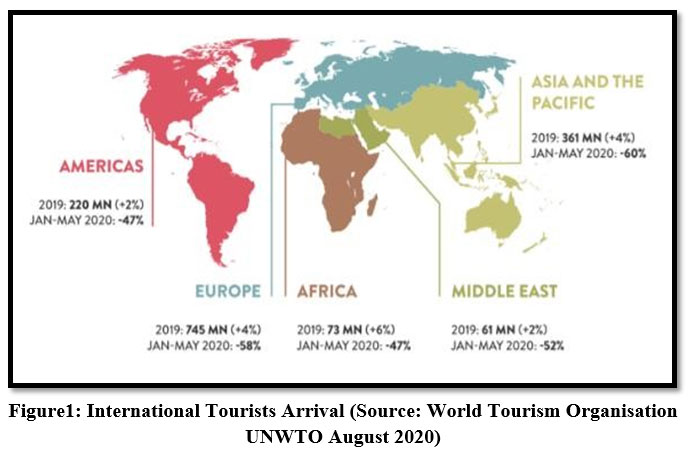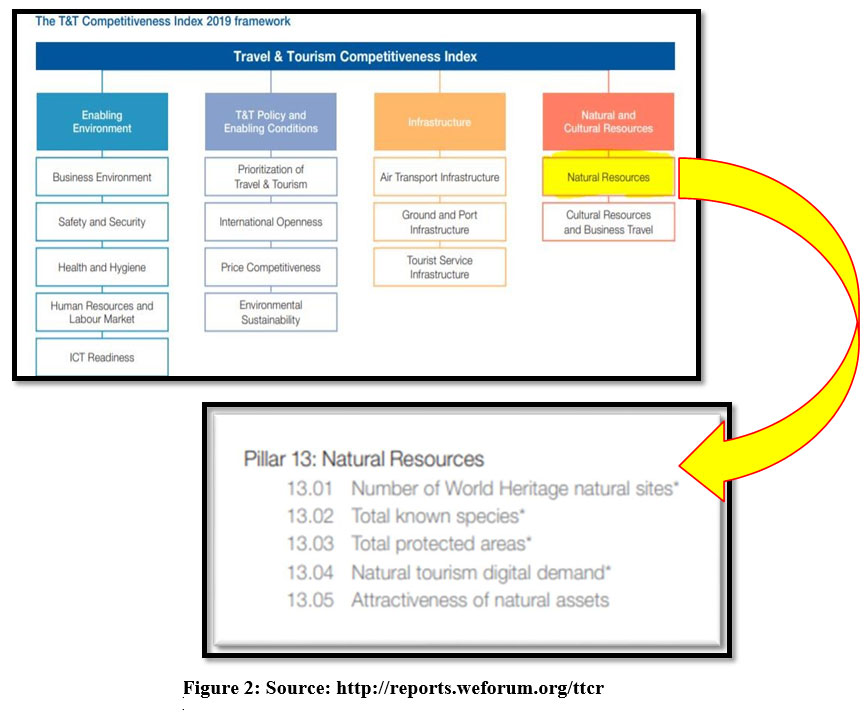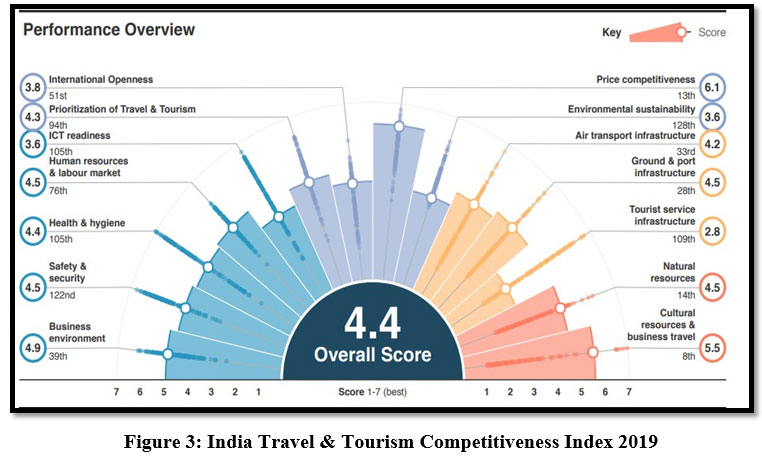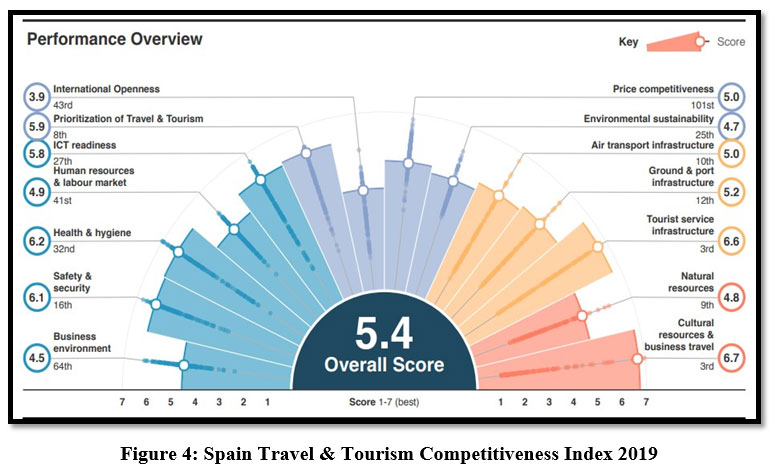COVID-19 Pandemic- A Ray of Hope towards Sustainable Nature-Based Tourism
Corresponding author Email: drsuneel.sbsc@gmail.com
DOI: http://dx.doi.org/10.12944/CWE.17.1.16
As the world wrestles with the pandemic and the travel industry comes to a standstill, stories via online media are surfacing that guarantee untamed life is getting back to isolated urban areas and that the Earth is recuperating itself. Millions are confronting the possibility of joblessness, a worldwide financial downturn is on the cards, medical services frameworks are being over-burden as contaminations develop dramatically, and disease transmission experts caution that, conceivably, a great many individuals could bite the dust. The travel and tourism industry and the environment are firmly connected.The travel industry research is beginning to look into especially as it connects with environmental change. Since the COVID-19 pandemic carried the travel industry to an edge, this is beneficial for the recuperation of the environment for the time being, because of pandemic-related travel limitations queues to observe nature have vanished. But, amid the entirety of this catastrophe, a brief look at something positive has shown up.
Copy the following to cite this article:
Kumar S, Sageena G. COVID-19 Pandemic- A Ray of Hope towards Sustainable Nature-Based Tourism. Curr World Environ 2022;17(1). DOI:http://dx.doi.org/10.12944/CWE.17.1.16
Copy the following to cite this URL:
Kumar S, Sageena G. COVID-19 Pandemic- A Ray of Hope towards Sustainable Nature-Based Tourism. Curr World Environ 2022;17(1). Available From:
Download article (pdf)
Citation Manager
Publish History
Select type of program for download
| Endnote EndNote format (Mac & Win) | |
| Reference Manager Ris format (Win only) | |
| Procite Ris format (Win only) | |
| Medlars Format | |
| RefWorks Format RefWorks format (Mac & Win) | |
| BibTex Format BibTex format (Mac & Win) |
Article Publishing History
| Received: | 09-08-2021 |
|---|---|
| Accepted: | 14-03-2022 |
| Reviewed by: | 
 Aleksandar Racz
Aleksandar Racz
|
| Second Review by: |

 Diego Adiel Sandoval-Chavez
Diego Adiel Sandoval-Chavez
|
| Final Approval by: | Dr. Rui Alexandre Castanho |
Introduction
Nature-Based Tourism is rapidly expanding with its significance for the effective promotion of natural resources and socioeconomic development1. The natural habitat and environmental conditions are vital in determining the viability of tourism destination2. The coronavirus disease (COVID-19) pandemic struck a fatal blow to the travel and tourism (T&T) industry, affecting economies, livelihoods, goods, and services globally. The travel industry was hit pointedly during the emergency's top, with international visitors considerably dropping by 56% until 2020 year3 (Fig. 1). Albeit influencing all the areas of human existence, the COVID-19 pandemic propagated exponentially impacting worldwide assets at a rapid pace4.
The pandemic has its root profound on how we interact, manage and conserve worldwide biodiversity. With sudden fall in tourism, the effect on biodiversity and environments is observed especially in Small Island Developing States (SIDS) and Least Developed Countries (LDCs) as far as exports and gross domestic product (GDP), their dependence on the sector for employment opportunities. Correspondence with inhabitants amidthe COVID-19 pandemic is significant as this would influence their mentality towards the travel industry in post-pandemictimes5.A comprehensive study by Khan et al.(2021) conceptualized requital of the travel industry regarding post-pandemic. Abdullah (2021) recognized the general supports for COVID-19's impending useful post-pandemic the travel industry plans. The key system based approach could give a request early phase to careful nature-based travel industry recovery, post-pandemic reassessment of objectives inside the organization plans of nature-based the travel industry.
 |
Figure1: International Tourists Arrival (Source: World Tourism Organisation UNWTO August 2020) |
Whilst robust escalations of tourism demand, it is expected to reach the significant contribution of 12,450 billion US dollars to global GDP in 2028 year6. The booming of the tourism sector has fostered economic growth and development, playing an important role in sustainable development. However, there is an increasing concern over the interdisciplinary complex dimensions of sustainability, particularly vulnerable to sub-sector of tourism- Nature-Based Tourism (NBT). Over the years of its expansion, NBTs are gaining prominence globally and hence can be recognized as an essential tool for conservation endeavors. Thus, it is critically important to establish more coordinated, pragmatic, and coherent approaches in NBTs to ensure tourism sustainability. The STEEP model (Social, Technological, Economical, Environmental and Political) framework suggests potential change drivers for articulations of expectation on ecological repayment can be associated with environmental grief i.e.likely to shape the future of the tourism industry7. What may a clearer comprehension of natural grief and ecological expectation bring to the table for the venture of confidence the travel industry on the planet that arises post-COVID-19? Confident the travel industry presents an extraordinary vision of the travel industry grant established upon a quality drove humanist viewpoint, trust has begun to be investigated and bantered inside the travel industry research as well as acquiring ubiquity across different pieces of the sociologies. An ethos of trust embraces the indeterminacy of things to come, 'however long the truth has not turned into a resolved one, as long as it has still unclosed conceivable outcomes the state of new shoots and new spaces of improvement, then, at that point, no outright issue with theperfect world can be raised by just genuine reality.
The current paper aims at an inherent need to explore the widely recognized drivers both at individual and community levels. The COVID-19 resulted in an unprecedented crisis in the tourism sector, while struggling to keep pace during the COVID pandemic, the crisis has proven to be an opportunity to reconsider how the travel industry interacts with society across all the levels and natural assets and environment towards a resilient travel industry.
Transformative opportunity in face of COVID-19: Nature-Based Tourism and Sustainable Development Goals.
It is always advantageous for the nations with natural assets to have an edge in tourism attraction which includes the natural environment quality, the species richness of the nation as estimated by the variety and variability which proxies the Protected Area Network (PAN) and the World heritage sites. However, there can be several internal and external constraints among entrepreneurs across NBTs influencing resilience and survival8,9. The NBTs are comparable to a double-edged sword, if there would not be individuals here, the issues would be considerably more manageable. But if individuals were not for tourism, there would not be money for protection. While conservation of NBT sites assumes a significant role in addressing the issue of overexploitation of resources; the risks to NBT from overexploitation of resources must also be considered, with the former being determinant of the latter. Tourists can tip the balance towards sustainable development, keeping the ventures within the carrying capacity of natural ecosystems.
Understanding the nature and associated shock resilience is significant, as a strong T&T area is basic for job opportunities, monetary development, and improvement in developing and developed economies. The World Economic Forum (WEF 2019) report10 on travel and tourism aiming at the theme “Travel and Tourism at a Tipping Point” covered the presentation of 141 economies through the Travel and Tourism Competitiveness Index (TTCI) and observed how the T&T area has reacted to monetary, security and wellbeing over later many years. The index comprises 4 sub-indexes with fourteen pillars and ninety individual indicators across various pillars; a set of policies to enable the sustainable development of the T & T industry area which adds competitiveness and development of a nation. Figure2 summarizes the index structure.
 |
Figure 2: Source: http://reports.weforum.org/ttcr |
Spain is at the top for the third successive report. In terms of T&T, Europe and Eurasia stay the most competitive followed by the Asia-Pacific regions. According to the report, Mexico China, Thailand, Malaysia, India, and Brazil - which are not included in the high-income category of economies but rather rank among the best thirty-five - stand out in the Cultural Resources and Business Travel Pillar through strong price competitiveness and their blend of the extant rich natural and cultural assets. The biennial investigation indicated strong development in movement and the travel industry area, with scores ascending in many nations, yet additionally cautioned of a drawing closer tipping point, wherein components like more affordable travel and fewer tourist barriers result in increased demands to unsustainability. As indicated by the World Travel and Tourism Committee (WTTC), the T&T area is the gauge to proceed to develop at 3.5% in 2019, outperforming the worldwide economic development of 2.5% for the ninth successive year.The interesting trajectory observed among the top twenty economies mirrored in terms of the natural resources, only eight economies could substantially come in the top twenty TTCI. One such comparison of the top scorer Spain with the Indian economy is shown in Figures 3 and 4 respectively11.
 |
Figure 3: India Travel & Tourism Competitiveness Index 2019 |
 |
Figure 4: Spain Travel & Tourism Competitiveness Index 2019 |
Capturing early signs of change and establishing a linkage between seventeen Sustainable Development Goals (SDGs) with one hundred and sixty-nine targets and discrete more than 240 indicators (UN 2015) can help us to resolve the pertinent issue of sustainability. Also, it is well recognized that rampant natural resources utilization and its effective management is a prerequisite to serving sustainable development. Despite the pressing need to achieve sustainability, little attention is gathered to the protection of natural resources12. The SDGs strongly correlated with tourism are SDGs 8, 12,14, and 15 on Promote sustained, inclusive, and sustainable economic growth, full and productive employment, and decent work for all; Sustainable Consumption and Production; Conserve and sustainably use the oceans, seas, and marine resources for sustainable development and Protect, restore and promote sustainable use of terrestrial ecosystems, sustainably manage forests, combat desertification, halt and reverse land degradation and halt biodiversity loss respectively. It is an enigma of industrialized development- an increase in demand and production calls for an expanding utilization of land resources and other assets of nature while an increasing number of travelers wish to travel in pristine environmental spaces amid clicking roaming wildlife. We should comprehend that COVID-19 is a grim reminder to indicate the relations between individuals and the environment. To prevent future outbreaks, there is an inherent need to address the threats to biodiversity, natural resources, and pristine ecosystems.
A fiasco of incredible extents is unfurling before our eyes. Right after the COVID-19 pandemic, the worldwide travel industry has everything except come to a standstill, as have numerous different parts of daily existence as the populaces of entire nations go into lockdown to contain and slow the spread of the infection. With the downhill side of tourism in response to the unprecedented COVID-19 crisis, there is a sincere need not to return to business as usual when the crisis is finished, rather consider it to be a golden opportunity through worldwide travel industry framework more adjusted to the SDGs. There can be the inclusion of social media-based commitment, co-creation, and management during pandemic circumstances and suggestions for the travel industry-dependent objections to construct recuperation techniques/strategies in adapting to the effect of pandemics to re-store the travel industry13,14.
Conclusion and Limitations
Although, the NBT and natural resource component of sustainability, has become a priority at all levels, given its multitude of impacts on other industries and sectors. Still, there is a comprehensive need to cover the different perspectives required to augment and promote the NBTs to embrace the accomplishment of the 2030 Agenda for Sustainable Development.
Understanding the linkages of pandemic and nature-based tourism might assist with propelling how we might interpret representations of life, recovery, and versatility to supportable the travel industry. The T&T industry should leverage the current health crisis and monetary emergency as a chance to modify more feasibly. However, a catastrophe for public and neighborhood economies, truth be told, in the long haul, if the travel industry does not recuperate, it will disincentivize networks from advancing natural resource management. It is in our grasp to change the travel industry and that rising out of COVID-19 turns into a defining moment for sustainability. We must return gradually and place sustainability at the core of efficient tourism management and foster tourism economic recovery.
The idea that the Earth can recuperate itself without any human impedance has resounded and carried solace to a large number of individuals.
The paper expects the significance and topicality of the COVID-19 crisis with the limitation of being a remarkable and ongoing emergency for the worldwide travel industry. Consequently, the current paper fills in as a preliminary to a more extensive conversation inside the travel industry talk and gives hypothetical heading to future travel industry research. There is a dire need for protection and management of natural resources; extant threats to NBT and natural resource as a principal component of sustainability needs to be clearly understood. Our aim currently is to plan for the travel industry’s fates by outfitting and directing natural expectations in a manner that genuinely recuperates the normal world and, simultaneously, mends our biological misery. While we may not arrive at a perfect world, a superior adaptation of the travel industry we at present know is without a doubt not outside our ability to understand assuming we work all in all, innovatively, and ideally.
Future Directions
Future research should consider empirical investigations to emphasize the need for sustainable tourism. Nations should envisage short-term economic gains from T & T industry to guarantee a promising future for the economies. T&T industry can navigate theeconomies, however just if strategy producers guarantee appropriate administration of their travel industry resources, which requires a comprehensive, multi-partner approach including policymakers and other stakeholders.
Acknowledgment
SK and GS would like to acknowledge Principal, ShaheedBhagat Singh College, University of Delhi, India, and Principal KeshavMahavidyalaya, University of Delhi, India respectively to allow working from home under lockdown period for which this article could be written.
Conflict of interest
No potential conflict of interest was reported by the author(s).
Funding source
There is no funding or financial support for this research work.
References
- Goodwin H. In pursuit of ecotourism. BiodiversConserv. 1996;5(3):277-291. DOI: 10.1007/BF00051774.
CrossRef - Bell S, Tyrväinen L, Sievänen T, Pröbstl U, Simpson M. Outdoor recreation and nature tourism: A European perspective. Living Rev Landsc Res. 2007;1(2):1-46. DOI: 10.12942/lrlr-2007-2.
CrossRef - UNWTO. World Tourism Barometer, May 2020—Special Focus on the Impact of COVID-19; 2020.
- Gössling S, Scott D, Hall CM. Pandemics, tourism and global change: a rapid assessment of COVID-19. J Sustain Tourism. 2021;29(1):1-20. DOI: 10.1080/09669582.2020.1758708.
CrossRef - Kamata H. Tourist destination residents’ attitudes towards tourism during and after the COVID-19 pandemic. Curr Issues Tourism. 2021:1-16. DOI: 10.1080/13683500.2021.1881452.
CrossRef - World Travel and Tourism Council. Travel and Tourism: Economic Impact 2018 World; 2018.
- Freyer W. Tourismus—Einführung in die Fremdenverkehrsökonomie. 5th Aufl. München, Germany: OldenbourgVerlag; 1995.
- Jiang Jinde, Zhang J, Zheng C, Zhang H, Zhang J. Natural soundscapes in nature-based tourism: leisure participation and perceived constraints. Curr Issues Tourism. 2020;23(4):485-499. DOI: 10.1080/13683500.2018.1540559.
CrossRef - Lundberg C, Fredman P. Success factors and constraints among nature-based tourism entrepreneurs. Curr Issues Tourism. 2012;15(7):649-671. DOI: 10.1080/13683500.2011.630458.
CrossRef - World Economic Forum. Report 2019. Available on https://reports.weforum.org/travel-and-tourism-competitiveness-report-2019/rankings.
- United Nations. Transforming our world: the 2030 agenda for sustainable development. https://sustainabledevelopment.un.org/content/documents/21252030%20Agenda%20for%20Sustainable%20Development%20web.pdf. Accessed August 28 2020; 2015.
- Zeng Y, Maxwell S, Runting RK, Venter O, Watson JEM, Carrasco LR. Environmental destruction not avoided with the Sustainable Development Goals. Nat Sustain. 2020;3(10):795-798. DOI: 10.1038/s41893-020-0555-0.
CrossRef - Rather RA. Monitoring the impacts of tourism-based social media, risk perception and fear on tourist’s attitude and revisiting behaviour in the wake of COVID-19 pandemic. Curr Issues Tourism. 2021:1-9. DOI: 10.1080/13683500.2021.1884666.
CrossRef - Chemli S, Toanoglou M, Valeri M. The impact of Covid-19 media coverage on tourist’s awareness for future travelling. Curr Issues Tourism. 2020:1-8. DOI: 10.1080/13683500.2020.1846502.
CrossRef - Khan SA, Yu Z, Umar M, de Sousa Jabbour AB, Mor RS. Tackling post-pandemic challenges with digital technologies: an empirical study. Journal of Enterprise Information Management. 2021 Jun 14.
CrossRef - Abdullah, M.N.A. Revenge tourism: Trend or impact post-pandemic COVID-19. In Promoting Creative Tourism: Current Issues in Tourism Research, 1st ed.; Routledge: London, UK, 2021; pp. 623–627.
CrossRef






